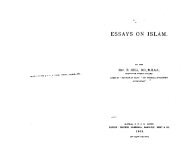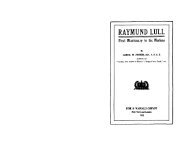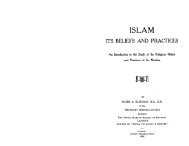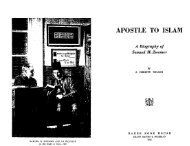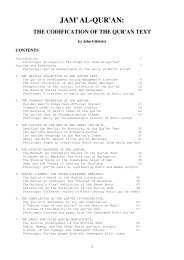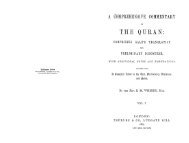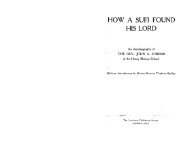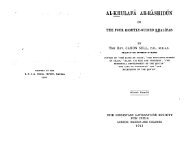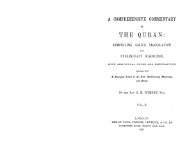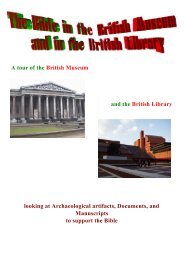Guillaume--Life of Muhammad.pdf - Radical Truth
Guillaume--Life of Muhammad.pdf - Radical Truth
Guillaume--Life of Muhammad.pdf - Radical Truth
Create successful ePaper yourself
Turn your PDF publications into a flip-book with our unique Google optimized e-Paper software.
3S<br />
26 The <strong>Life</strong> <strong>of</strong> <strong>Muhammad</strong><br />
to God and imploring his help against Abraha and his army. As he was<br />
holding the knocker <strong>of</strong> the temple door, 'Abdu'I-Mugalib said:<br />
0 God, a man protects his dwelling so protect Thy dwellings. I<br />
Let not their cross and their craft tomorrow overcome Thy craft (39).'<br />
'Ikrima b. 'Amir b. Hashim b. 'Abdu Manaf b. 'Abd aI-Dar b. Qu~ayy<br />
said:<br />
o God, humiliate al-Aswad b. Maf~iid<br />
Who took a hundred camels wearing their collars;<br />
Between Hid' and Thabir and the deserts,<br />
He shut them in when they should be pasturing freely,<br />
And delivered them to the black barbarians,<br />
Withdraw from him thine aid, 0 Lord, for Thou art worthy to be<br />
praised (4-0).<br />
'Abdu'l-Mullalib then let go the knocker <strong>of</strong> the door <strong>of</strong> the Ka'ba and<br />
went <strong>of</strong>f with his Quraysh companions to the mountain tops where they<br />
took up defensive positions waiting to see what Abraha would do when he<br />
ocoupied Mecca. In the morning Abraha prepared to enter the town and<br />
'made his elephant ready for battle and drew up his troops. His intention<br />
was to destroy the temple and then return to the Yaman. When they made<br />
the elephant (its name was Mal:>miid) face Mecca, Nufayl b. Habib came<br />
up to its flank and taking hold <strong>of</strong> its ear said: 'Kneel, Mal:>miid, or go<br />
straight back whence you came, for you are in God's holy land I' He let go<br />
<strong>of</strong> its ear and the elephant knelt, and Nufayl made <strong>of</strong>f at t,Q~ speed for the<br />
top <strong>of</strong> the mountain. The troops beat the elephant to maRe It get up but it<br />
would not; they beat its head with iron bars; they stuck hooks into its<br />
underbelly and scarified it; but it would not get up. Then they made it<br />
face the Yaman and immediately it got up and started <strong>of</strong>f. When they set<br />
it towards the north and the east it did likewise, but as soon as they directed<br />
it towards Mecca it knelt down.<br />
Then God sent upon them birds from the sea like swallows and<br />
36 starlings; each bird carried three stones} like peas and lentils, one in its<br />
beak and two between its claws. Everyone who was hit died but not all<br />
were hit. They withdrew in flight by the way they came, crying out for<br />
Nufayl b. Habib to guide them on the way to the Yaman. When he saw<br />
the punishment which God had brought down on them Nufayl said:<br />
Where can one flee when God pursueth?<br />
AI-Ashram is the conquered not the conqueror (4-1).<br />
I /fildl. the plural <strong>of</strong> billa, means a collection <strong>of</strong> houses and also the people who live<br />
therein. For, TOJ;lahU al-Shahrastiini, Milal, has billahu 'his neighbour', and for ghadwan<br />
'tomorrow' 'at!wan, which could be rendered 'hostile' here. For qiblatand he has Ka'batana.<br />
20 mibal here is said by C. andAbu Dharr to mean strength and power; but it really means<br />
'guile', 'strategy accompanied by force'. 'Craft', d. Kraft, appears to be the best rendering.<br />
The passage is a reminiscence <strong>of</strong> Sura 13. 14, and the- idea may be found in the Quranic<br />
saying <strong>of</strong> God: Khayru l-maki,in, 3. 47. T. has preserved four lines <strong>of</strong> no poetic merit which<br />
I.H. preferred to excise.<br />
Nufayl also said:<br />
The <strong>Life</strong> <strong>of</strong> <strong>Muhammad</strong><br />
Our greetings, Rudllfna!<br />
You rejoice our eyes this morning!<br />
[Your fuel-seeker came to us last night,<br />
But we had naught to give hjm.]<br />
If you had seen, but you will not see, Rudayna,<br />
What we saw on al-Muhassab's side J<br />
You would have forgive~ ~e and praised my action<br />
And ~ot have been vexed at what has passed and gone.'<br />
I praised God when I saw the birds<br />
And I feared the stones that might fall upon us.<br />
Everyone was asking for Nufayl<br />
As though lowed the Abyssinians a debt.<br />
As they withdrew they were continually falling by the wayside dying<br />
mIserably by every waterhole. Abraha was smitten in his body and as they<br />
took him away his fingers fell <strong>of</strong>f one by one. Where the fing~r had been<br />
t~ere arose ,a:; evil sore. exuding pus and blood, so that when they brough~<br />
hIm to ~an a he was hke a young fledgeling. They allege that as he died<br />
his heart burst from his body. (A. Deserters from the army, labourers<br />
and campfollowers remained in Mecca and became workers and shepherd~<br />
for the population.)<br />
Ya'~iib b. 'Utba told me that he was informed that that year was the<br />
first tIme that measles and smallpox had been seen in Arabia' and too<br />
t~t it was the first time that bitter herbs like rue, colocynth, and Asclepr:a.:<br />
gtgantea were seen.<br />
. When God sent <strong>Muhammad</strong> he specially recounted to the Quraysh<br />
his goodnes~ and favour in turning back the Abyssinians in order to<br />
preserv~ theIr state and permanence. 'Did you not see how your Lord<br />
dealt WIth the owners <strong>of</strong> the elephant? Did He not reduce their guile to<br />
sheer terror? And sent upon them flocks <strong>of</strong> birds, throwing hard clay<br />
stones upon them, making them as blades <strong>of</strong>corn that have been devoured."<br />
And again: 'For. the uniting <strong>of</strong> Quraysh, their uniting the caravans to 37<br />
ply summer and wlllter. Then let them worship the Lord <strong>of</strong> this temple<br />
who has fed them so that they hunger not, and made them safe from fear',;<br />
: A pl~ce betwee? Mecca.and Mini in the valley <strong>of</strong> Mecca. See Yiqut.<br />
PosslblY'hayna 18 a poetical form <strong>of</strong> haynand, 'between us'. The line is based on SUra<br />
57· 23·<br />
3 Sura 105.<br />
4 Sura 106. A good discussion <strong>of</strong> this difficult passage will be found in Lane's uric<br />
p. 79h ~d c. There are three. riv~1 r~adings: iltif (adopted by our author), iltif, and #i:<br />
Accor~g to all three the meamng IS satd to be 'for their keeping to the journey etc.' Other<br />
authontlea ~ay that the ~rst rea~ing means 'for the preparing and fitting out'. Others say<br />
~t accordm~ to the .t~rd reading the meaning is 'the protecting'. According to Ibn al.<br />
A dbI the po~t <strong>of</strong> this .18 that the. f~ur 80m <strong>of</strong> 'Abdu ManAf were given freedom to travel<br />
by the .Byzantines, Perstan, AbY88IDlana, and l:Iimyaris respectively and so were able to go<br />
and bnng com from neiahbourina territories. There may be a sound hi,tonca1 kernel to<br />
T· 942<br />
Au. 91



